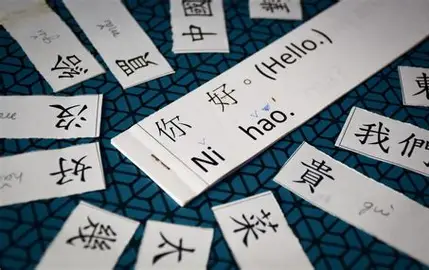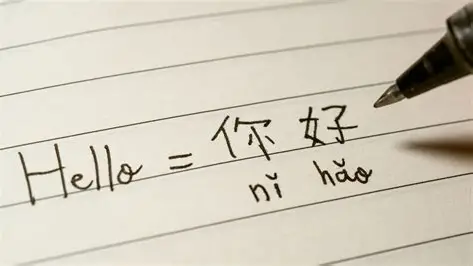Is Mandarin Chinese Hard to Learn? 5 Reasons Why It’s Not
Mandarin Chinese is often labeled as one of the hardest languages to learn, especially for non-native speakers. For English speakers, Mandarin is widely recognized as a hard language due to its complex characters, tonal language structure, and the sheer number of Chinese characters to learn, making it seem incredibly daunting.
Compared to other languages, such as Spanish—which is generally considered easier to learn for native English speakers—Mandarin is significantly harder.
However, while Mandarin Chinese is undoubtedly a challenging language, there are many reasons why it might not be as extremely difficult as it appears. In this article, we will explore five key reasons why learning Mandarin Chinese is more achievable than you might think.
Learn authentic Chinese from those who live and breathe the culture.
Specially tailored for kids aged 3-18 around the world!
Get started free!
1. The Writing System: Logical and Systematic
One of the most intimidating aspects of learning Chinese language is its writing system. Unlike Western languages that use the Latin alphabet, Chinese uses characters to represent words and concepts. Chinese words are often formed by combining two or more characters, each of which represents a specific meaning or sound.

This can seem overwhelming when you consider that there are so many characters to learn. However, the Chinese writing system is far more logical and structured than it appears at first glance.
Radicals: The Building Blocks of Chinese Characters

Each Chinese character is composed of radicals, which are like building blocks. These radicals often provide clues about the meaning or pronunciation of the character. For example:
- The character for “mother” (妈) includes the radical for “woman” (女) on the left side.
- The character for “river” (河) has the water radical (氵) on the left.
| Radical | Example Character | Meaning |
|---|---|---|
| 女 | 妈 (mā) | Mother |
| 水 | 河 (hé) | River |
By learning these radicals, you can start to recognize patterns and make educated guesses about the meanings of new characters. This makes the process of learning Chinese characters more manageable.
Practicality of Character Knowledge
While there are thousands of Chinese characters, you don’t need to master all of them to be functional. In fact, knowing just 1,000 characters will allow you to understand about 90% of written Chinese in everyday contexts. This is comparable to the number of high-frequency words you would need to know in a language like English(foreign language) to be able to read and write effectively.
2.Easier Than You Think
When it comes to grammar, Mandarin Chinese is actually much simpler than many other languages. Chinese grammar is known for its simplicity, with minimal verb conjugations and straightforward sentence structures. Unlike European languages such as English, French, or German, Chinese does not have verb conjugations based on tense, person, or number. For example, in English, verbs change in the present tense: “I speak,” “he speaks,” “we speak.” In Mandarin: 我说 (wǒ shuō), 他说 (tā shuō), 我们说 (wǒmen shuō).
The verb “to speak” (说) remains the same regardless Simplified Grammar: of the subject.
No Gender or Articles
Additionally, Chinese does not have complex noun declensions or gender distinctions. There are no articles like “the” or “a” in English, and nouns do not change form based on their role in a sentence. This means that you can focus more on vocabulary and sentence structure rather than worrying about intricate grammatical rules.
Consistent Word Order
Mandarin Chinese follows a relatively consistent word order, similar to English. For example:
- English: “I like to eat apples.”
- Mandarin: 我喜欢吃苹果 (wǒ xǐhuan chī píngguǒ).
This consistency makes it easier for learners to construct sentences and express themselves.
3. Pinyin: A Bridge for Learners

One of the most significant tools that makes learning Mandarin Chinese more accessible is pinyin. Pinyin is a system that uses the Latin alphabet to represent the pronunciation of Chinese characters. It was developed to help learners of the Mandarin language master pronunciation and reading.
Pinyin helps learners practice correct pronunciations of Chinese words. This allows learners to focus on the sounds of the language without being immediately overwhelmed by the characters. Some Mandarin sounds are similar to those found in an English word, which can help English speakers with pronunciation. There are also similar sounds between Mandarin and English, making learning pronunciation less intimidating.
Tones Made Easier
Pinyin also helps with learning tones, which are an essential aspect of Mandarin Chinese. There are four main tones in Mandarin, and each tone changes the meaning of a word. For example:
- “ma” can mean:
- Mother (妈, mā) with the first tone.
- Hemp (麻, má) with the second tone.
- Horse (马, mǎ) with the third tone.
- Scold (骂, mà) with the fourth tone.
By using pinyin, learners can gradually become familiar with the tones and improve their pronunciation. Over time, they can start to associate the characters with their pinyin spelling and eventually transition to reading and writing characters more fluently.
4. Abundant Learning Resources
In the past, learning Mandarin Chinese might have been more challenging due to a lack of accessible resources. However, today, there is a wealth of materials and tools available to help learners at all levels. The learning process for Mandarin has become more accessible thanks to these resources, making it easier to progress through each stage.
You can learn Chinese using a variety of modern tools and methods, which cater to different learning styles and needs. It’s beneficial to start learning Chinese early, as this helps you overcome the initial steep learning curve and makes future progress smoother.
Watching TV shows and movies in Mandarin is also a valuable way to improve your listening and comprehension skills through exposure to natural language use. From textbooks and online courses to mobile apps, language exchange programs, and using a Chinese dictionary to look up characters and understand their meanings, there are countless ways to practice and improve your Mandarin Chinese skills.
Interactive Learning Tools
- Language Learning Apps: Apps like Duolingo, Memrise, and Anki offer interactive lessons, flashcards, and pronunciation practice.
- Online Dictionaries: Websites like Pleco and MDBG provide comprehensive dictionaries and translation tools.
- Language Exchange Platforms: Platforms like HelloTalk and Tandem connect learners with native Chinese speakers who are interested in learning other languages.
Structured Learning Paths
Many online courses and textbooks provide structured learning paths, making it easier for beginners to progress systematically. For example, the Foreign Service Institute (FSI) offers comprehensive courses designed for learners of Mandarin Chinese.
5. The Benefits Outweigh the Challenges
While learning Mandarin Chinese may require more time and effort compared to some other languages, the benefits of mastering this language are significant. Mandarin is the most widely spoken language in the world, with over a billion native speakers in Mainland China and many more in Taiwan, Singapore, and other parts of Southeast Asia. Learning to speak Chinese opens up communication with millions of people worldwide.
Learning a new language is challenging regardless of your native language, but the rewards are significant. Becoming a proficient native speaker of Mandarin is not necessary to benefit from learning the language. Developing speaking skills through practice and conversation is essential for progress. Language exchange programs allow learners to learn English or Chinese by practicing with native speakers. Mandarin is a valuable second language for personal and professional growth. Compared to many languages around the world, Mandarin stands out for its unique features and global importance. By learning Mandarin, you open up opportunities for travel, business, and cultural exchange.
Cognitive Benefits
Learning Mandarin Chinese can enhance your cognitive abilities. Studies have shown that learning a tonal language like Mandarin can improve your memory, listening skills, and even musical abilities. The process of learning to read and write Chinese characters also engages different parts of the brain, providing a unique mental workout.
Cultural Insights
Learning Mandarin can give you a deeper appreciation for Chinese literature, history, and culture. Chinese literature is rich and diverse, with works dating back thousands of years. By learning the language, you can read these works in their original form and gain a better understanding of Chinese values and traditions.
Practical Applications
- Travel: Mandarin is spoken in many countries and regions, making it a valuable language for travel.
- Business: China is a major economic power, and knowing Mandarin can open up career opportunities.
- Cultural Exchange: Learning Mandarin allows you to engage with a rich cultural heritage and connect with millions of people around the world.
FAQ About learning mandarin chinese
Is chinese the hardest language to learn ?
NO
what is the hardest language in the world?
While there’s no single definitive answer as difficulty is subjective, Mandarin Chinese is often cited as the most difficult language for English speakers to learn, due to its complex writing system, tonal pronunciation, and lack of cognates with English.
However, other languages like Arabic, Japanese, and some lesser-known languages also pose significant challenges
How many English speakers are there in the world?
The English language is now spokess than 5en by approximately 1.35 billion people worldwide. That’s 17% of the world’s population. While l% native English speakers.
Conclusion
While Mandarin Chinese is often perceived as one of the hardest languages to learn, there are many reasons why it might not be as challenging as you think.
The logical structure of the writing system, the simplicity of the grammar, the use of pinyin, the availability of learning resources, and the numerous benefits of mastering the language all contribute to making it an achievable goal for non-native speakers.
Of course, learning any new language requires dedication and effort, but with the right approach and mindset, Mandarin Chinese can be a rewarding and enriching experience.
Learn authentic Chinese from those who live and breathe the culture.
Specially tailored for kids aged 3-18 around the world!
Get started free!
Bella holds a Master’s degree from Yangzhou University and brings 10 years of extensive experience in K-12 Chinese language teaching and research. A published scholar, she has contributed over 10 papers to the field of language and literature. Currently, Bella leads the research and development of WuKong Chinese core courses, where she prioritizes academic rigor alongside student engagement and cognitive development. She is dedicated to building a robust foundation for young learners covering phonetics (Pinyin), characters, idioms, and classical culture while ensuring that advanced courses empower students with comprehensive linguistic mastery and cultural insight.






![Learning Chinese For Kids: 5 Best Resources For Chinese Online [2025] Learning Chinese For Kids: 5 Best Resources For Chinese Online [2025]](https://wp-more.wukongedu.net/blog/wp-content/uploads/2024/01/image-173-520x293.jpeg)




![Learn Mandarin: Top 6 Tips + 4 Platforms [2025 Updated] Learn Mandarin: Top 6 Tips + 4 Platforms [2025 Updated]](https://wp-more.wukongedu.net/blog/wp-content/uploads/2023/12/image-42-520x293.jpeg)











![3 Ways to Say I Love You in Chinese Number [2025 Guide] 3 Ways to Say I Love You in Chinese Number [2025 Guide]](https://wp-more.wukongedu.net/blog/wp-content/uploads/2024/01/image-33-520x293.png)
![How to Write & Read Chinese in Chinese Letters [2025 Guide] How to Write & Read Chinese in Chinese Letters [2025 Guide]](https://wp-more.wukongedu.net/blog/wp-content/uploads/2023/12/image-102-520x293.png)
![All About the Mandarin Chinese Alphabet [2025 Updated] All About the Mandarin Chinese Alphabet [2025 Updated]](https://wp-more.wukongedu.net/blog/wp-content/uploads/2023/12/image-99-520x293.png)


Comments0
Comments